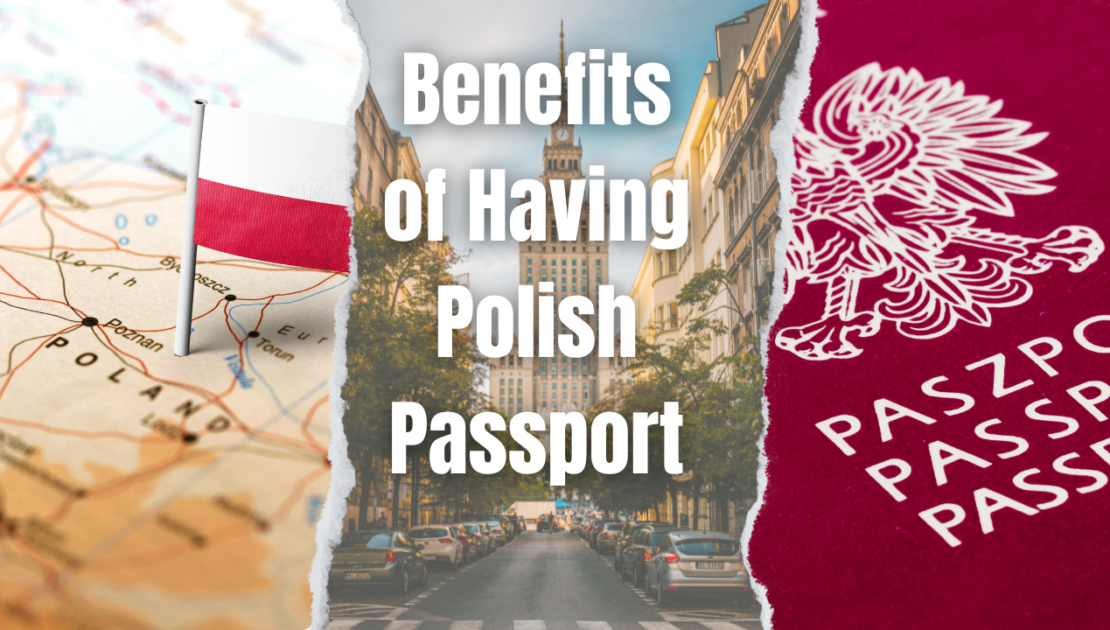- 29 May 2024
- Admin
- No Comments

Benefits of Having a Polish Passport
Possessing a Polish passport offers numerous benefits, including opportunities for travel, work, and study both in Poland and abroad. As an EU member, Poland grants its citizens free movement and access to 27 EU countries, simplifying travel and employment in these nations.
Become EU Citizen
Having Polish citizenship also makes you an EU citizen, extending the same rights to your children. The EU guarantees protection of consumer rights, personal data, and the free movement of goods, services, and people. This ensures access to safe products and services and safeguards your personal data according to European standards.
Travel freely within the Schengen Area
The EU’s Free Movement Directive allows you to travel visa-free within the EU and several other European countries. Additionally, you benefit from conveniences like separate airport gates and no border controls within the EU. These rights extend to your family members as well.
Live and Work in any EU Country
As an EU citizen, you can live and work in any EU member state without restrictions. You can choose any country to reside in, and local authorities cannot discriminate against you based on nationality or origin. No work permit is required to be employed in another EU country. You can work under the same conditions as nationals and enjoy the same social rights and social security benefits.
Business Flexibility
Holding both Polish and EU citizenship simplifies starting and running your own business. It allows you to explore various business opportunities within the European Union’s competitive market. You benefit from the EU’s supportive business environment, which includes access to a larger customer base, reduced regulatory barriers, and potential funding opportunities. Additionally, you can easily establish and operate your business in any EU member state, leveraging resources and networks across Europe. This dual citizenship opens doors to partnerships and collaborations, enhancing your potential for success in the diverse and dynamic EU market. Your business can thrive with the numerous advantages offered by the EU.
Free Education System
As a Polish citizen, you have the right to attend schools and universities in Poland, as well as to participate in appealing study programs abroad. Polish universities provide high-quality education, offering programs that equip you with the knowledge and skills necessary for professional success. These institutions are known for their excellent teaching standards and diverse academic offerings. Additionally, being a Polish citizen opens opportunities to engage in international education programs, enhancing your global perspective and career prospects. Whether studying domestically or abroad, you can benefit from a robust educational foundation that prepares you for a successful professional future.
Access to Health Care
As an EU citizen, you have access to healthcare in any EU country. If you need urgent medical treatment while abroad, you can receive free healthcare or be reimbursed for your medical expenses. However, this may sometimes require settling formalities and obtaining the necessary certificates in advance. This ensures that you can access the required medical services without financial burden. Being an EU citizen provides the security of knowing that healthcare is available to you across member states, enhancing your peace of mind when traveling or living in different EU countries.
Legal Protection
Every EU citizen is entitled to protection of their rights and freedoms, including freedom of expression, assembly, and association, as well as the principles of rule of law, equality, and non-discrimination. If you believe your rights have been violated, you can utilize EU-provided tools and procedures, such as appealing to the European Court of Justice or the European Court of Human Rights. These institutions ensure that your rights are upheld and provide avenues for legal recourse. Being an EU citizen guarantees that your fundamental freedoms are protected across all member states, offering a robust system for addressing grievances and seeking justice.
Vote and Stand for Election
As an EU citizen, you have the right to vote and run as a candidate in European Parliament elections and local elections in the country where you reside. You can also stand as a candidate in European Parliament elections in any EU country where you hold citizenship, even if you do not live there. This ensures that you can participate fully in the democratic processes of both your home country and the country you live in, contributing to the political landscape and having a say in the decisions that affect you at both local and European levels.
Retain your first Citizenship
You maintain your original citizenship.
The regulations regarding dual nationality differ based on your existing citizenship. Generally, acquiring Polish citizenship will not impact your primary nationality. However, it’s crucial to review the legal requirements of your country before making a decision.
Get Support in Difficult Situations
With both Polish and EU citizenship, you’re eligible for assistance during challenging times like job loss or financial crises. You can access unemployment benefits, social aid, and financial support when facing difficulties. Additionally, as a Polish national, you have access to free legal aid if needed. This allows you to seek legal guidance from an attorney in situations involving legal disputes or other legal matters. Having dual citizenship provides a safety net and legal support system, ensuring that you can navigate hardships effectively and access necessary resources when needed.
Summary
Becoming an EU citizen and retaining Polish citizenship offers a range of benefits. You gain visa-free travel within the EU and Schengen area, can live and work anywhere in the EU, access a free education system, and receive healthcare across EU countries. Legal protection includes rights to vote and stand for election, along with safeguards for freedoms and legal recourse. Dual citizenship facilitates business opportunities and provides support during challenging times, including unemployment benefits and free legal aid. This combination ensures a broad range of opportunities, rights, and protections across Europe.










